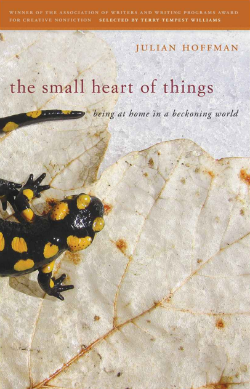The Small Heart of Things - Being at Home in a Beckoning World
The Small Heart of Things - Being at Home in a Beckoning World
By Julian Hoffman
The University of Georgia Press
ISBN: 978-0820345567
Reviewed by Shaun Lambert
The author lives in a world most of us know nothing about, and may not even have heard about. He lives in the Prespa Lakes, a transboundary park in the Balkans, shared by Greece, Albania and Macedonia. This collection of essays is hard to categorize: travel writing, environmental witness, meditations – are all words that could be used. I believe they are essays in perception, intelligent and ethical perception.

As the author pays attention to the world of nature around him he has stepped out of automatic judgements about what is worth looking at, and simply gazes at what is there. The truth at the heart of the book, around which the elegiac writing unfolds, is an idea from the poet Rainer Maria Rilke:
Everything beckons us to perceive it,
murmurs at every turn…
For the author these words illustrate the method by which he tries to see, ‘The art of perceiving is more about reception than it is vision. We don’t have to struggle to see things, Rilke suggests, for they are already there, calling us. The difficulty lies in unlearning our tendency toward indifference.’ (p.41)
As I read the book, which I have done slowly, saving a chapter a day as a meditative treat, I find myself drawn out of indifference. The doors of my perception are opened wider.
In one of the essays in this book, entitled
The Distance Between Us, a black-suited stranger walks ahead of the author on a whale-backed hill overlooking Morecambe Bay. The stranger magically disappears further on in the walk, but keeps reappearing over time in the writer’s imagination. The stranger can stand as a symbol for the reader, because as the reader you are mysteriously drawn into the landscapes that are so clearly imaged for us in each essay. You are beckoned in.
Each handcrafted story shows us how the doors of our perception are opened, if, like the author, we pay loving attention to the places around us. Our universal human capacity for attention, when finely honed, as in this wordsmith’s collection, enables us to see the beauty in the ordinary as in the marvellous. I was particularly drawn in by the birds of sky and marsh, forest and garden that fly in and out of the pages of the book, like a musical refrain, as if an invisible thread of relationship exists between the writer and these winged friends. We feel safe when we hear their song.
The right considering and noticing by the author tracks our interconnectedness with the places in which we live. This seeing has an ethical, an ecological shape. There is an ecstasy here in the perceiving, but also pain. It costs to whet and sharpen our awareness to this level; we have to give up our attachment to lesser things. This paying of loving attention leads us not to possess things but to inhabit them. We have to give up other narratives of success and money and things in order to find the treasure we are shown here. There are easier prizes, but this book awakens a longing, as the monk who discovered champagne put it, ‘to taste the stars.’
There is also a haunting sadness that moves melodically through the book as the fragile and dissolving histories of the land, people and animals are spun in words. But there is also hope. I have the sense that as one looks at the world with this loving attention to the ordinary, overlooked and fleeting, our very gaze can make flowers bloom again.
We live in a culture that bricks up the windows and doors of our soul, our doorway to perception. The words and stories of this book, lovingly and carefully begin to remove those bricks one by one, and slowly light from the world fills us again. Light that also warms us, as indifference is dissolved. In these essays we find that the small heart of things lives at the centre after all.
Julian Hoffman lives beside the Prespa Lakes in northern Greece with his wife Julia, monitoring birds in upland areas where wind farms have been built or proposed. His writing often explores the relationships that exist between humans and the natural world, and the stories to be found when we open ourselves to the places around us. The Small Heart of Things was selected by Terry Tempest Williams as the winner of the AWP Award for Creative Nonfiction, described by her as a "tapestry of embodied stories...a book of faith in the natural histories of community."
Along with winning the 2011 Terrain.org Nonfiction Prize, other writing of his has recently appeared in Kyoto Journal, EarthLines, Silk Road Review and Cold Mountain Review.
You can catch up with Julian at
www.julianhoffman.wordpress.com
The Revd Shaun Lambert is minister of Stanmore Baptist Church
Shaun Lambert, 23/12/2013